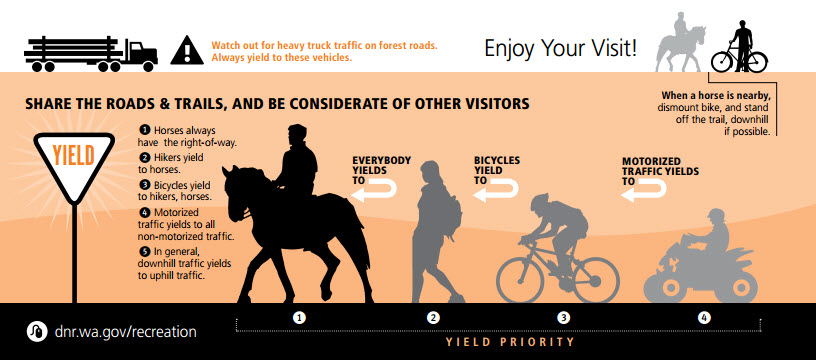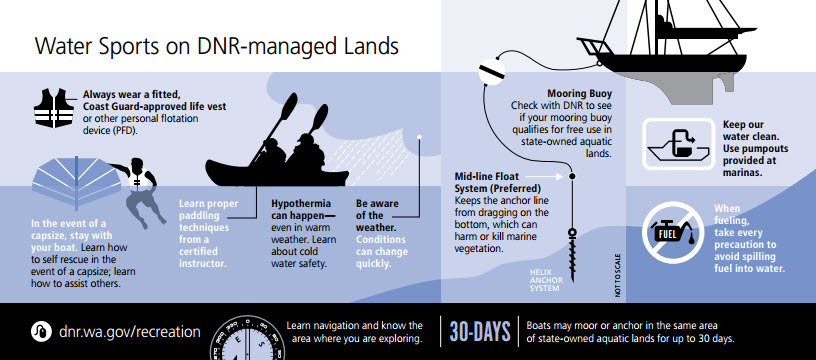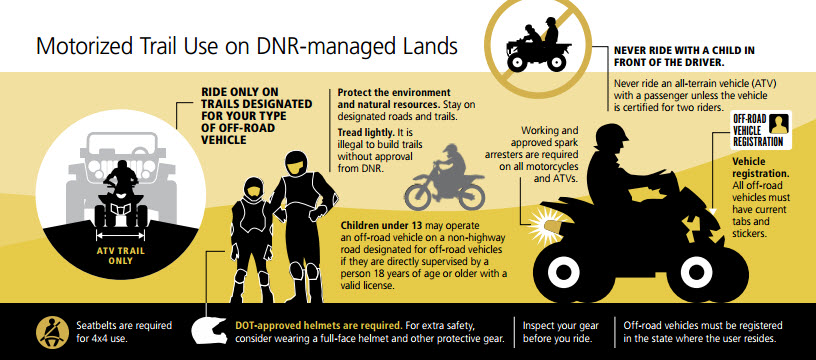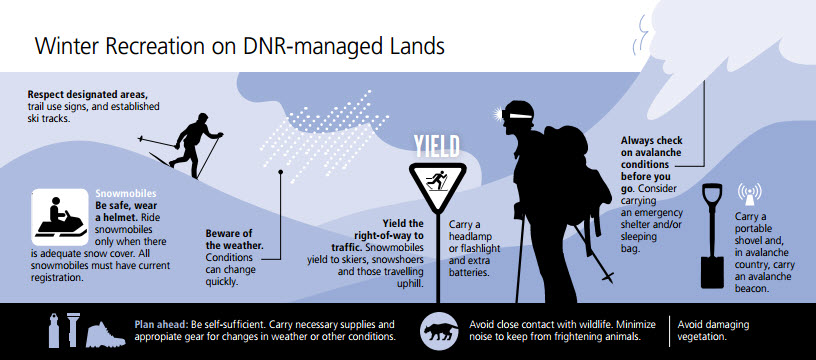 Commissioner of Public Lands Hilary Franz invites you to come out and Discover DNR recreation. We have more than 160 recreation sites and 1,200 miles – and growing – of trail. Our campsites are available first come, first served at no additional cost for vehicles with a valid Discover Pass, making it easier than ever to find your new favorite outdoor destination. Reservation campsites are available at the Margaret McKenny Campground in Capitol Forest and the Elbe Hills ORV Campground in Elbe Hills.
Commissioner of Public Lands Hilary Franz invites you to come out and Discover DNR recreation. We have more than 160 recreation sites and 1,200 miles – and growing – of trail. Our campsites are available first come, first served at no additional cost for vehicles with a valid Discover Pass, making it easier than ever to find your new favorite outdoor destination. Reservation campsites are available at the Margaret McKenny Campground in Capitol Forest and the Elbe Hills ORV Campground in Elbe Hills.
What to do, and how to do it
Trail and Green Dot Road Maps
- PDF and paper maps
- Mobile-ready maps
Boating
DNR-managed land has diverse water access points. Find kayaking opportunities down the middle fork of the Snoqualmie River in our Middle Fork Natural Resources Conservation Area, launch from one of our day-use lake sites, such as Robbins Lake in the Tahuya State Forest, or camp at one of our lake campgrounds, such as Chopaka Lake in the Loomis Forest Block. Enjoy fly fishing or catch-and-release fishing at one of our lake campgrounds or day use areas. Whether it's sea kayaking to one of our boat-access campgrounds or spending a day out on the lake, DNR-managed land has something for everyone.
To access DNR's aquatic lands with a powerboat, you'll need a registered and insured boat. Check with DNR to see if your mooring buoy qualifies for free use in state-owned aquatic lands. You can moor or anchor your boat in the same area of state-owned aquatic lands for up to 30 days. DNR encourages mooring buoy owners to use the helix anchor system, which keeps the anchor line from dragging on the water floor and damaging marine habitat.
Remember to always wear a Coast Guard-approved life vest, be aware of changes in weather, and know the area you're navigating. For more information about boating on DNR-managed lands, check out our guide to safe and fun recreation.
Plan your next boating trip to DNR-managed land with our statewide recreation map. A Discover Pass is required to park at a water-access site on DNR-managed lands.
Camping: No reservations required
DNR's campgrounds offer primitive settings and access to many recreation opportunities on DNR-managed land. With an annual Discover Pass for your vehicle, camping is free all year long.
Find a campground
Use our statewide recreation map (above) to see all of our campgrounds statewide. To see what's open and closed, click here.
Campsites are first-come, first-served, so don't worry about making a reservation. There are a limited number of reservation campsites available at the Margaret McKenny Campground in Capitol Forest and the Elbe Hills ORV Campground in Elbe Hills.
You can stay 10 days in a 30-day period at any of DNR's campsites statewide, if not otherwise posted. During your stay, please practice leave no trace principles and pack out what you pack in. Quiet hours are between 10 p.m. and 7 a.m. Enjoy campfires in approved fire pits in designated campgrounds only.
When camping outside of our designated campgrounds, dispersed camping, you won't find toilets, picnic tables, trash cans, drinking water, and fire pits, which means you cannot have firepits and you must pack out what you pack in. We allow dispersed camping in some of our forests. Dispersed camping is not allowed at day-use sites.
Don't Move Firewood: Help protect Pacific Northwest forests by preventing the spread of invasive species. Firewood can carry insects and diseases that can threaten the health of our western forests. Please purchase your firewood near your campsite. Visit Dontmovefirewood.org for more information.
If you love camping, consider becoming a volunteer campground host.
Fishing
In addition to the rivers passing through DNR managed lands, we also offer fishing at more than 30 day-use recreation sites near lakes. From catch-and-release fly-fishing at Merrill Lake near Vancouver, Washington to rainbow trout fishing at Leader Lake near Okanogan, you'll find fishing opportunities statewide.
For more information, fishing guidelines and fish stocking timelines, visit the Washington Department of Fish and Wildlife's website. To find fishing opportunities on DNR-managed lands, use our statewide interactive recreation map, above.
Hang Gliding and Paragliding
Want to see DNR-managed lands from above? Lift off from Tiger Mountain State Forest's Poo Poo Point, Blanchard Forest's Samish Overlook, or the Chelan Butte Sky Park. DNR-managed land uniquely offers paragliding and hang gliding opportunities.
Plan your trip with our statewide recreation map. A Discover Pass is required to access recreation sites on DNR-managed lands.
Hiking
DNR-managed land is home to some of Washington state's most-loved hikes, such as the Mount Si Natural Resources Conservation Area, the Buck Creek Trailhead near Trout Lake, and Blanchard Forest's Oyster Dome. Whether it's a strenuous trek or gentle nature walk, you'll find it in DNR's 1,100 miles of trails.
Parking at DNR trailheads requires a Discover Pass. Remember to practice leave no trace principles and only hike within your own abilities. If you're hiking with a dog, make sure it's leashed. All recreation activities must yield to horses and pack animals.
Check for closures before you make the drive. Head to our statewide recreation map to find trailheads, directions, and more information.
Horseback Riding
Saddle up your horse at one of our equestrian-oriented camps, like Sahara Creek Horse Camp in the Elbe Hills State Forest, or our Green Mountain Horse Camp in the Green Mountain State Forest. Or, head out for a trail ride at the Les Hilde Trail System in Skagit County or from the Whites Ridge Trailhead in the Ahtanum State Forest. Areas open to horseback riding also allow a variety of pack stock including llamas, mules, goats, alpacas, and donkeys.
Check for closures before you make the drive.
Plan your trip with our statewide recreation map. A Discover Pass is required to access recreation opportunities, including horseback riding, in DNR-managed lands.
Hunting
DNR manages more than 3 million acres of state trust lands that are accessible for hunting. Accessing DNR land for hunting requires a Discover Pass for your vehicle. Washington Department of Fish and Wildlife oversees game management units on DNR-managed lands. Head to the Washington Department of Fish and Wildlife for more information about hunting in Washington.
In partnership with the Washington Department of Fish and Wildlife, Recreation Conservation Office, the U. S. Forest Service, and private timber companies, DNR offers a disabled hunter road access entry program by drawing only. The Road Access Entry Program provides hunters who have lower extremity mobility disabilities access into areas with fewer barriers and vehicle distractions.
DNR also manages a Green Dot Road system in partnership with the Washington Department of Fish and Wildlife and private landowners to provide opportunities for dispersed recreation such as camping, hunting, off-road vehicle riding, and wildlife viewing. View maps of the Green Dot Roads in the Ahtanum State Forest, Naneum Ridge State Forest, Colockum Wildlife Area, LT Murray Wildlife Area, Oak Creek Wildlife Area, Whiskey Dick and Quilomene wildlife areas, and Wenas Wildlife Area.
When you're hunting, please be aware of other recreationists and brush gatherers in the forest.
Mountain Biking
DNR-managed lands have many opportunities for mountain biking. From mountain biking on East Tiger Mountain to our Thrillium trail in the Yacolt Burn State Forest and Little Larch in Capitol State Forest, DNR-managed land has just the ride for you.
Remember to be safe and always wear a helmet when you're mountain biking. Bike within your own abilities and yield to other non-motorized trail users. Practice caution on wet and muddy trails to protect them from damage. Check for trail closures before making the drive. Look for trailheads on our statewide recreation map. A Discover Pass is required to access DNR-managed lands with your vehicle.
Note: E-bikes or electronic bikes are considered motorized vehicles, and are therefore allowed only on DNR trails that allow off-road vehicles. Take a look at our information about riding off-road vehicles in the tabs below.

Picnicking
Head to one of our day-use sites to take advantage of lovely views and natural settings. A Discover Pass is required to park at DNR's day-use sites. DNR has many picnic areas, such as the Woodard Bay Natural Resources Conservation Area, that provide ideal scenery for a sunny day. Whether you're looking for a quick bite to eat near cascading falls, like Yacolt Burn State Forest's Dougan Creek, or along the beach, like Murdock Beach on the Olympic Peninsula, DNR-managed land is sure to have the spot for you.
Remember to practice leave no trace principles and keep dogs on leash. For more information about recreation on DNR-managed lands, visit our guide to safe and fun recreation.
Riding Off Road Vehicles
Did you know DNR has more than 400 miles of motorized recreation trails for you and your family to enjoy? Try out trails in Yacolt Burn, Walker Valley, Reiter Foothills Forest, Elbe Hills State Forest, Tahuya State Forest, Capitol State Forest, Little Pend Oreille, Beverly Dunes and the Ahtanum State Forest.
DNR also manages a Green Dot Road system in partnership with the Washington Department of Fish and Wildlife and private landowners to provide opportunities for dispersed recreation such as camping, hunting, off-road vehicle riding, and wildlife viewing. View maps of the Green Dot Roads in the Ahtanum State Forest, Naneum Ridge State Forest, Colockum Wildlife Area, LT Murray Wildlife Area, Oak Creek Wildlife Area, Whiskey Dick and Quilomene wildlife areas, and Wenas Wildlife Area.
Keep your off-road vehicle trips safe and fun. Check out our interactive guide to ORV use on DNR-managed land.
You're required to:
- Have an approved spark arrester
- Have current tabs and stickers
- Wear a DOT-approved helmet
- Ride on trails designed for your off-road vehicle.
- Not ride after dark.
Plan your trip with our statewide recreation map. A Discover Pass is required for vehicle access to DNR-managed lands. Motorcycle riders should carry the pass with them.
Rock Climbing
DNR offers rock climbing as a dispersed recreation activity that occurs on DNR-managed lands outside of a developed recreation facility or trail. Popular sites include the Mount Si Natural Resources Conservation Area, Gold Bar Boulders near Gold Bar, and Oyster Dome in the Blanchard Forest. Contact the region office near the area you're interested in rock climbing at before you make the drive.
Snow Activities
Kick back at a backcountry huts, located in the Tahoma State Forest, or enjoy snowshoeing, cross-country skiing, and snowmobiling at a DNR sno-park, such as the Lily Lake Winter Recreation Area. Other areas popular for winter recreation, such as snowmobiling, include the Red Saddle and Whites Ridge winter recreation trailheads.
To access a sno-park with your vehicle, you will either need an annual Sno-Park Permit, or a one-day Sno-Park Permit in addition to a one-day Discover Pass or annual Discover Pass. For sno-park information, check out our sister agency's sno-park program and check in with your region's DNR office for local conditions. To park at a winter recreation trailhead, such as DNR's Whites Ridge, Red Saddle and Ahtanum Meadows, you will only need a Discover Pass.
Practice our safe tips, like carrying a headlamp or flashlight and extra batteries, when you go into the backcountry. Beware of changes in weather, and always check on avalanche conditions before you go. Plan ahead, and carry necessary supplies and appropriate gear should you need it. For more information about safe winter activities on DNR-managed land, head to our guide to safe and fun recreation. To plan your next snow adventure on DNR-managed land, head to our statewide recreation map.
Target Shooting
We also allow target shooting on some of our landscapes, though the safest place to target shoot is at the shooting range in your local community. Target shooting is allowed on DNR-managed land only in areas that meet criteria identified in WAC 332-52-145, which includes having an unobstructed, earthen backstop that can safely stop all projectiles and debris. Some areas may be designated or posted as no shooting to ensure public safety. Pack out all shells, brass, paper, and other debris. No shooting within 500 feet of a recreation site or structure. Unless otherwise posted, target shooting is not allowed one-half hour after sunset to one-half hour before sunrise. Don't shoot across, along, or down roads or trails. Use manufactured targets only. Exploding targets and tracer bullets are prohibited. Avoid hazardous areas unsuitable for target shooting by contacting the region for more information regarding the area you have in mind. See our graphic guide below (click to enlarge) for more information.

Volunteering
Want to get involved? Volunteer and give back to the DNR recreation areas you enjoy most. Apply to become a campground host, Forest Watch volunteer, or attend a work party near you. Remember, you can use your volunteer hours to earn a Discover Pass. Head to our calendar to find an upcoming volunteer event in your area.
Other Activities
Geocaching
DNR has many opportunities for geocaching on state lands across Washington.
Harvesting
You may harvest mushrooms, berries, floral greens, and other select resources for personal use only from some areas on DNR-managed lands. Harvesting of any forest products from DNR-managed campgrounds and picnic sites, natural area preserves or natural resources conservation areas is prohibited, unless the harvest is specifically included in the site's management plan. No reselling.
Mushrooms: Limited to three gallons of a single species per day, not to exceed nine gallons plus one mushroom per year.
Berries: Limited to three gallons of a single species per day, not to exceed nine gallons per year.
Brush and ferns: Root ball removal, not more than two plants per person, per day. Not more than four plants per person per year.
Cones: Not to exceed five pounds of cones per day.
Bear grass: Not more than five pounds per person per day, not more than 15 pounds per person per year.
Conks: All species, not more than five conks per day.
Seaweed: Not to exceed 10 pounds wet weight per day per person. For detailed harvesting information, click here.
Firewood: Limited to six cords per person, per year. By permit only.
Pack Stock Use
Enjoy a hike or horseback ride with your pack animal. DNR-managed trails open to horseback riding also allow pack stock use such as llamas, mules, goats, alpacas, and donkeys. Visit our statewide recreation map for more information about our horseback riding trail systems, such as the Nicholson Horse Trails in the Elbe Hills State Forest or Les Hilde Trail System.
Rockhounding
Washington has an extraordinary variety of rocks and fossils. Collectors have the opportunity to find beautiful agates, amethysts, garnets, jaspers, opals, and even the occasional nugget of gold. View the Washington Geological Survey's map of rockhounding sites throughout Washington state. Before heading out to rockhound, take a look at our tips. You'll need prior written authorization from DNR before you collect on state trust lands. Please contact our region offices for more information.Click here to learn more about the Washington Geological Survey, housed within DNR.







